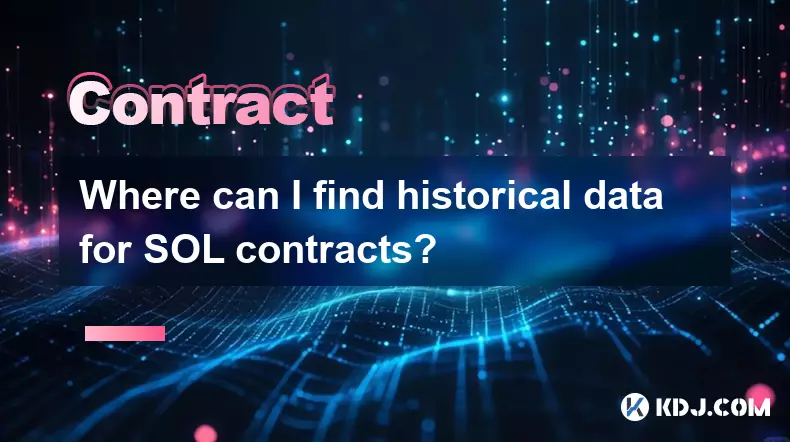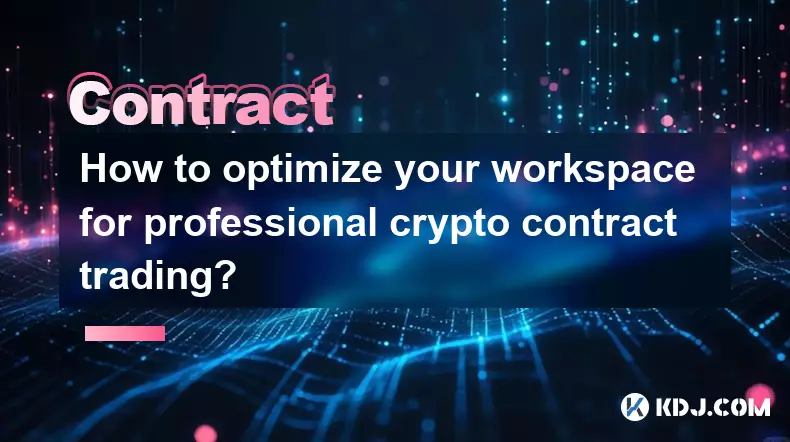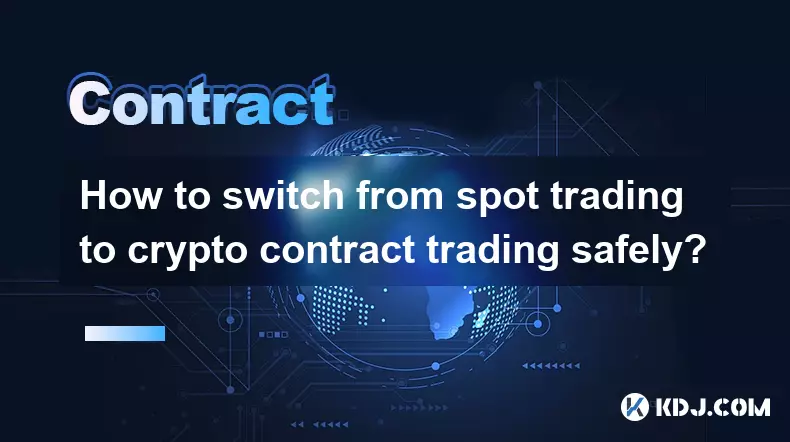-
 bitcoin
bitcoin $87959.907984 USD
1.34% -
 ethereum
ethereum $2920.497338 USD
3.04% -
 tether
tether $0.999775 USD
0.00% -
 xrp
xrp $2.237324 USD
8.12% -
 bnb
bnb $860.243768 USD
0.90% -
 solana
solana $138.089498 USD
5.43% -
 usd-coin
usd-coin $0.999807 USD
0.01% -
 tron
tron $0.272801 USD
-1.53% -
 dogecoin
dogecoin $0.150904 USD
2.96% -
 cardano
cardano $0.421635 USD
1.97% -
 hyperliquid
hyperliquid $32.152445 USD
2.23% -
 bitcoin-cash
bitcoin-cash $533.301069 USD
-1.94% -
 chainlink
chainlink $12.953417 USD
2.68% -
 unus-sed-leo
unus-sed-leo $9.535951 USD
0.73% -
 zcash
zcash $521.483386 USD
-2.87%
Where can I find historical data for SOL contracts?
Solana blockchain explorers like Solscan and APIs from Helius or Alchemy enable detailed historical analysis of smart contract interactions, including transactions, logs, and state changes over time.
Oct 10, 2025 at 06:54 pm

Accessing Historical Data for SOL Contracts
1. Solana blockchain explorers provide comprehensive tools to retrieve historical data related to smart contracts on the SOL network. Platforms like Solscan and SolanaFM allow users to search for specific contract addresses, view transaction histories, and analyze token movements over time. These explorers index all on-chain activities, making them reliable sources for detailed contract information.
2. By entering a contract’s public key into these explorers, users can access timestamps, associated wallets, transferred amounts, and method calls executed on the contract. This level of transparency supports audits, research, and investment analysis within the Solana ecosystem.
3. Developers and analysts often use Application Programming Interfaces (APIs) provided by Solana Labs or third-party services such as Helius, Alchemy, and QuickNode. These APIs enable programmatic access to raw blockchain data, allowing retrieval of historical logs, instruction parameters, and state changes tied to SOL-based contracts.
4. The Solana JSON-RPC API supports queries for confirmed transactions involving specific programs or accounts. With proper filtering, one can extract every interaction with a given contract since its deployment. This includes initialization events, token swaps, staking actions, and governance votes if applicable.
5. For structured datasets spanning long periods, platforms like Flipside Crypto and Dune Analytics offer pre-processed dashboards and SQL-accessible databases. Users can run custom queries to extract timelines of contract usage, user adoption rates, volume trends, and error occurrences across different dApps built on Solana.
Tools for In-Depth Contract Analysis
1. Dune Analytics enables users to create visual reports based on historical interactions with Solana smart contracts. Community-shared dashboards already track major protocols like Raydium, Mango Markets, and Orca, offering insights into liquidity flows and user behavior patterns.
2. Flipside Crypto provides free access to enriched Solana data tables, including account activity, program executions, and token transfers. Analysts can write SQL queries to isolate specific contract functions or detect anomalies in execution frequency over time.
3. Blockchair and Solana Beach serve as alternative explorers that display real-time and past transaction records. While less feature-rich than Solscan, they still offer basic lookup capabilities for verifying contract deployment dates and identifying large transfers.
4. GitHub repositories maintained by protocol teams often include documentation and event schemas that help interpret historical log data. Understanding the structure of emitted events is crucial when parsing low-level contract interactions from raw blockchain output.
5. Some decentralized finance (DeFi) platforms publish archived snapshots of their contract states, which can be cross-referenced with on-chain data to validate accuracy. These snapshots typically cover total supply, reserve balances, and active positions at specific block heights.
Challenges in Retrieving Accurate Historical Records
1. Due to Solana’s high throughput and frequent chain reorganizations during congestion, certain transactions may appear temporarily before being invalidated. This requires careful validation when compiling historical datasets to avoid including orphaned or failed instructions.
2. Not all nodes retain full historical archives indefinitely. Public RPC endpoints might limit how far back data can be queried, especially for older blocks beyond a few thousand confirmations. Running a dedicated archival node ensures complete access but demands technical expertise and infrastructure investment.
3. Contract upgrades via upgradeable program architectures complicate tracking. A single program address may execute different bytecode versions over time, so analysts must correlate deployment transactions with upgrade authorities and buffer accounts to reconstruct accurate logic timelines.
4. Event logging on Solana relies on manual emission within program code. If developers do not emit structured logs for critical actions, reconstructing certain behaviors from transaction data alone becomes challenging and sometimes impossible.
5. Compression techniques used by some protocols, particularly in NFT minting or stateless wallets, obscure direct ownership trails. Historical analysis in these cases requires decoding off-chain metadata or relying on indexer interpretations, introducing potential inaccuracies.
Frequently Asked Questions
Q: Can I export transaction history for a Solana contract in CSV format?A: Yes, both Solscan and Dune Analytics allow exporting query results or page data into CSV files. On Solscan, navigate to the contract’s page and use the download option available in the transactions tab.
Q: Are there free APIs to pull historical Solana contract data programmatically?A: The Solana public RPC endpoint (https://api.mainnet-beta.solana.com) is free to use and supports fetching historical transactions. However, rate limits apply. Services like Helius offer enhanced free tiers with webhooks and better performance.
Q: How far back does Solana’s blockchain data go?A: Since Solana’s mainnet launch in March 2020, continuous data exists for all blocks. Most public tools support querying from genesis block onward, though response times may increase for very old records.
Q: Is it possible to track wallet interactions with a specific contract function?A: Yes, by decoding instruction data using the contract’s ABI or IDL file, you can filter transactions that invoke specific methods. Tools like Anchor framework generate IDLs that make this process more straightforward for developers.
Disclaimer:info@kdj.com
The information provided is not trading advice. kdj.com does not assume any responsibility for any investments made based on the information provided in this article. Cryptocurrencies are highly volatile and it is highly recommended that you invest with caution after thorough research!
If you believe that the content used on this website infringes your copyright, please contact us immediately (info@kdj.com) and we will delete it promptly.
- Bitcoin Faces Identity Crisis as Speculators Flock to Prediction Markets and Ultra-Short Options
- 2026-02-02 00:30:06
- MGK and Jelly Roll Honor Ozzy Osbourne at Pre-Grammy Gala, Sparking Fan Frenzy
- 2026-02-02 00:50:02
- Super Bowl Coin Flip: Unpacking the Prediction Power of Heads or Tails
- 2026-02-02 01:30:01
- Litecoin Price Cracks 9-Year Floor Amidst Market Breakdown: What's Next for the OG Crypto?
- 2026-02-02 01:20:02
- Crypto News, Cryptocurrency Markets, Latest Updates: A Topsy-Turvy Start to 2026
- 2026-02-02 01:15:01
- New York Minute: LivLive Presale Ignites, While Solana Navigates Choppy Waters
- 2026-02-02 01:15:01
Related knowledge

How to close a crypto contract position manually or automatically?
Feb 01,2026 at 11:19pm
Manual Position Closure Process1. Log into the trading platform where the contract is active and navigate to the 'Positions' or 'Open Orders' tab. 2. ...

How to understand the impact of Bitcoin ETFs on crypto contracts?
Feb 01,2026 at 04:19pm
Bitcoin ETFs and Market Liquidity1. Bitcoin ETFs introduce institutional capital directly into the spot market, increasing order book depth and reduci...

How to trade DeFi contracts during the current liquidity surge?
Feb 01,2026 at 07:00am
Understanding Liquidity Dynamics in DeFi Protocols1. Liquidity surges in DeFi are often triggered by coordinated capital inflows from yield farming in...

How to trade micro-cap crypto contracts with high growth potential?
Feb 01,2026 at 02:20pm
Understanding Micro-Cap Crypto Contracts1. Micro-cap crypto contracts refer to derivative instruments tied to tokens with market capitalizations under...

How to optimize your workspace for professional crypto contract trading?
Feb 01,2026 at 08:20pm
Hardware Infrastructure Requirements1. High-frequency crypto contract trading demands ultra-low latency execution. A dedicated workstation with a mini...

How to switch from spot trading to crypto contract trading safely?
Feb 01,2026 at 03:59pm
Understanding the Core Differences Between Spot and Contract Trading1. Spot trading involves the immediate exchange of cryptocurrencies for fiat or ot...

How to close a crypto contract position manually or automatically?
Feb 01,2026 at 11:19pm
Manual Position Closure Process1. Log into the trading platform where the contract is active and navigate to the 'Positions' or 'Open Orders' tab. 2. ...

How to understand the impact of Bitcoin ETFs on crypto contracts?
Feb 01,2026 at 04:19pm
Bitcoin ETFs and Market Liquidity1. Bitcoin ETFs introduce institutional capital directly into the spot market, increasing order book depth and reduci...

How to trade DeFi contracts during the current liquidity surge?
Feb 01,2026 at 07:00am
Understanding Liquidity Dynamics in DeFi Protocols1. Liquidity surges in DeFi are often triggered by coordinated capital inflows from yield farming in...

How to trade micro-cap crypto contracts with high growth potential?
Feb 01,2026 at 02:20pm
Understanding Micro-Cap Crypto Contracts1. Micro-cap crypto contracts refer to derivative instruments tied to tokens with market capitalizations under...

How to optimize your workspace for professional crypto contract trading?
Feb 01,2026 at 08:20pm
Hardware Infrastructure Requirements1. High-frequency crypto contract trading demands ultra-low latency execution. A dedicated workstation with a mini...

How to switch from spot trading to crypto contract trading safely?
Feb 01,2026 at 03:59pm
Understanding the Core Differences Between Spot and Contract Trading1. Spot trading involves the immediate exchange of cryptocurrencies for fiat or ot...
See all articles










































































